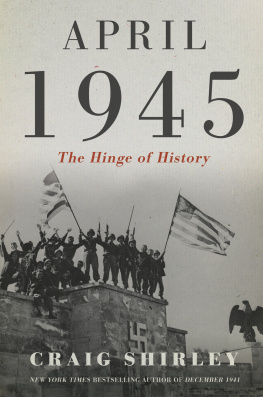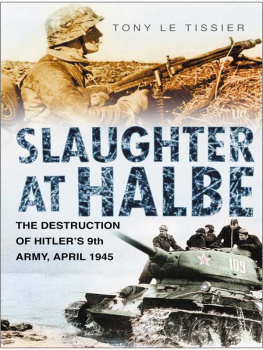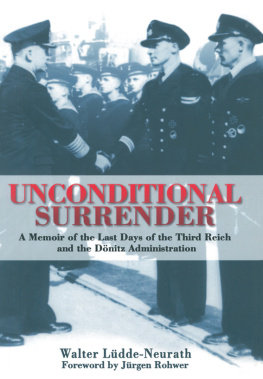
Swansong 1945
A Collective Diary of the
Last Days of the Third Reich
Walter Kempowski
Translated from the German by
Shaun Whiteside

First published in Great Britain by Granta Books 2014
Original German edition first published in 2005.
Walter Kempowski: Das Echolot. Abgesang 45 Ein kollektives Tagebuch
Copyright 2005 Albrecht Knaus Verlag, Munich, a division of Verlagsgruppe
Random House GmbH, Munich Germany
English translation copyright Shaun Whiteside 2014
Foreword copyright Alan Bance 2014.
First American Edition 2015
First published in Great Britain under the title SWANSONG 1945:
A Collective Diary from Hitlers Last Birthday to VE Day
All rights reserved
For information about permission to reproduce selections from this book,
write to Permissions, W. W. Norton & Company, Inc.,
500 Fifth Avenue, New York, NY 10110
For information about special discounts for bulk purchases, please contact
W. W. Norton Special Sales at specialsales@wwnorton.com or 800-233-4830
ISBN 978-0-393-24815-9
ISBN 978-0-393-24816-6 (e-book)
W. W. Norton & Company, Inc.
500 Fifth Avenue, New York, N.Y. 10110
www.wwnorton.com
W. W. Norton & Company Ltd.
Castle House, 75/76 Wells Street, London W1T 3QT
For Cherry Duyns
Contents
Despite being one of Germanys best-known and most respected authors, Walter Kempowski (19292007) is not yet recognized in the English-speaking world. This book will begin to build a wider reputation for a writer who believed that history should not be left solely to historians. As Julian Barnes once wrote, History isnt what happened. History is just what historians tell us. Over the second half of the twentieth century, Kempowski dedicated his life to researching and memorializing the common experience of the Second World War. While his own story is essentially German, his painstaking and devoted work has international breadth and relevance.
Kempowski was born into a comfortable family of shipowners and timber exporters in the picturesque Baltic port of Rostock, where a happy childhood was to end prematurely with the coming of war. He experienced Allied bombing in both Rostock and Hamburg: he later confessed that as a schoolboy he hoped for an Allied raid on Rostock (which duly came) to save him from handing in his Latin homework. The family, though patriotic, was anti-Nazi, but Walter was inevitably recruited to the Hitler Youth, where playing truant to listen to his brothers banned jazz records landed him in a punishment unit. In February 1945, aged sixteen, he was conscripted as a messenger into a Luftwaffe youth auxiliary, anti-aircraft unit. Two months later, in the last days of the war, his soldier-father, a veteran of the First World War, was killed by a Russian bomb in East Prussia.
After the war, Kempowski began an apprenticeship in a printing works, but a year later he took a job with the US Army of Occupation in a labor supervision company in Wiesbaden. In 1948, keen to see his mother and his home city again, he returned with his brother Robert to his beloved Rostock, where both were arrested by the Soviet authorities and sentenced by military tribunal to twenty-five years in a labour camp for espionage: Kempowski had given the US authorities bills of lading proving that the Soviets were taking more goods from Germany (reparations) than the Allies had agreed. His mother, too, received a ten-year prison sentence, of which she served six, for complicity in the brothers crime.
Kempowski served eight years in jail, mostly in the Soviet, and later GDR, prison Bautzen, notorious for its high death rate. On his release in 1956 as the result of an amnesty, he moved first to Hamburg and then, in 1957, to Gttingen, where he finished his schooling and trained as a teacher. Marriage in 1960 to another teacher, and two children born in 1961 and 1962, completed his family. He taught first in the village school of Breddorf in Lower Saxony, then moved in 1965 to another village, Nartum, near Bremen, where he later designed a beautiful house with a tower to hold his vast collection of writings and photographs. Today the collection is housed in the Academy of Arts in Berlin, although there is still a small personal archive in Rostock, holding manuscripts and some memorabilia, such as the boots he wore on his release from Bautzen, and a small library of his favourite authors, including Theodor Fontane and Thomas Mann, both, like him, associated with the Baltic coast.
Kempowski had embarked on his literary career with Im Block (In the Cell Block), published in 1969 to little acclaim. An expanded and republished version, called Ein Kapitel fr sich (A Separate Chapter) , was filmed for TV in 1979. The rest of his literary career and his fame as a writer were shaped by two massive series of publications. The first was his Deutsche Chronik (German Chronicle), consisting of six novels and three enquiry volumes. The novels represent something like a history of the Kempowski family from the late nineteenth century. Tadellser und Wolff (1971), the first to be published, dealt with the interwar period and earned him a national reputation, especially after it appeared on German TV. The best known of his enquiries was Haben Sie davon Gewusst? Deutsche Antworten (Did You Know about It? German Answers), for which he questioned Germans about their knowledge of concentration and extermination camps.
The authors second great series was his Echolot (Sonar or Echo Soundings) project, made up of ten volumes, which concludes with Abgesang 45 (Swansong 1945). The title Das Echolot brings to mind sonar signals sent into the depths of the ocean and bouncing back to configure the seabed or contours of objects out of sight beneath the surface. Kempowski first conceived the idea of gathering ordinary peoples accounts of their personal experiences of the Second World War in Bautzen prison, where the inmates endlessly shared their war histories. Later, in Gttingen, he salvaged from the pavement a dead soldiers diary, letters and photographs, trampled on by passers-by. From this beginning, he went on during the 1970s to collect autobiographies, letters and diaries, and to commit himself to the idea that these private, insignificant but authentic testimonies must be preserved and made available to posterity. The simultaneity of these writings across the whole social spectrum sets up in itself a striking resonance.
He called it rescuing the voices of the dead. His mission developed to include international participation in the war, so that, having initially concentrated on material supplied by his immediate circle, he broadened and intensified his search at the beginning of the 1980s, scouring second-hand bookshops and flea markets and putting advertisements in newspapers to solicit contributions, and thus to create an archive of unpublished biographies. It grew into an ambitious plan, paralleled only by the great and very differently resourced and organized British Mass Observation project, which aimed to create a collective diary of the years 1943 to 1949. Kempowski put much of his own money into funding his project.
From quite early on, the notion began to develop of composing published volumes from his collection. Originally, he wanted to present every day of the war through his collective diary, but he soon realized that this was an impossibly over-ambitious project and chose to select only certain dates for coverage. He also modified his plan to give voice only to unknown, ordinary people, deciding instead that the voices of important participants, from Hitler to Churchill, would help to display the war in all its aspects.
Next page









